Learning and knowledge sharing are fundamental to the LHSS Project. We invite you to search LHSS knowledge products and resources for the latest approaches, insights, and learning in the field of integrated health systems strengthening.
Local leaders share valuable perspectives on migration and the role of a robust health systems in enhancing equitable access to quality health care for everyone.
Key stakeholders in Barranquilla, Colombia provide valuable insights on the importance of quality health care for migrants and their families.
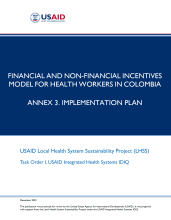
This annex presents the implementation plan for the FINFI model, which was established based on the PDCA cycle. The PDCA cycle serves as a framework for addressing and solving problems. The plan creates a roadmap that will guide the country and the MSPS in the implementation of the FINFI model. The plan also contains key elements for the implementation of the model and is organized by management level, defining key actors and objectives for each level.
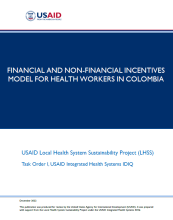
This document proposes a Financial and Non-Financial Incentives (FINFI) model to improve the quality of life and performance of Colombian human resources for health (HRH). It outlines the problems identified within the Colombian health system that precipitated the development of the FINFI model, and provides a description and analysis of the proposed FINFI model and recommendations to assist in the implementation of the model.
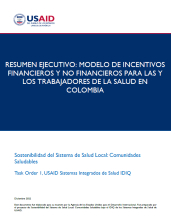
This Spanish document summarizes the Financial and Non-Financial Incentives model, including the methodology of the model and recommendations for its implementation.
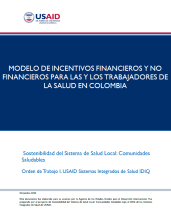
This Spanish document proposes a model of Financial and Non-Financial Incentives (FINFI) that contributes to the development and quality of life of human talent in health (HRT).
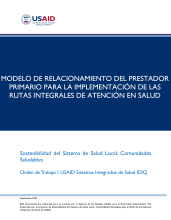
This Spanish document presents a model for strengthening the relationship of the actors involved in the implementation of two Comprehensive Health Care Routes (RIAS): the Comprehensive Care Route for the Promotion and Maintenance of Health (RPMS) and the Comprehensive Maternal and Perinatal Health Care Route (RIAMP). The model aims to ensure the successful implementation of the RIAS, which will strengthen the Colombian health system to provide comprehensive health care for Venezuelan migrants and host communities.
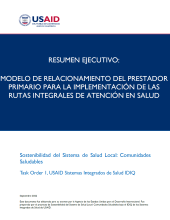
This document presents a summary of the model for strengthening the relationship of the actors involved in the implementation of the Comprehensive Care Route for the Promotion and Maintenance of Health (RPMS) and the Comprehensive Maternal and Perinatal Health Care Route (RIAMP). A full report is also available in Spanish.
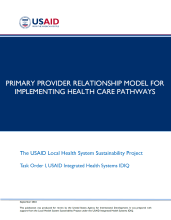
This document proposes a model to improve the relationship among stakeholders involved in the implementation of two Comprehensive Healthcare Pathways (RIAS, as per its Spanish acronym) in Colombia: the Pathway for the Promotion and Maintenance of Healthcare (RPMS, as per its Spanish acronym) and the Pathway for Maternal and Perinatal Health Care (RIAMP, as per its Spanish acronym).
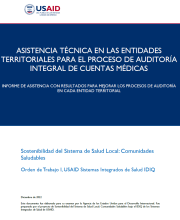
This Spanish report presents the work of USAID's Healthy Communities Program (LHSS Colombia) in supporting the MSPS in characterizing the medical account audit process.
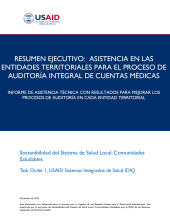
This Spanish summary document describes the interventions implemented by USAID's Healthy Communities Program (LHSS Colombia) to strengthen the capacity of the Minister of Health and Social Protection (MSPS) and territorial governments to audit medical accounts.
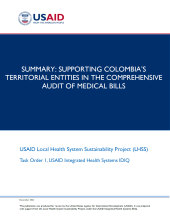
This document describes the interventions implemented by LHSS Colombia to strengthen the capacity of the Ministry of Health and Social Protection (MSPS) and the territorial governments to audit medical bills.
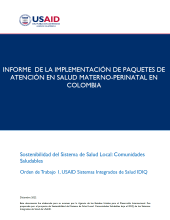
This Spanish document systematizes the experiences of the planning and implementation process of projects financed with international cooperation resources for the provision of maternal and perinatal health care. The document also contains the methodology for the systematization of the experience and the lessons learned and recommendations derived from the systematization process.
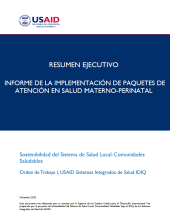
This Spanish document contains the experiences of various actors in planning and implementing projects funded by international cooperation resources that facilitate the provision of maternal and perinatal health care.
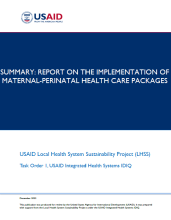
This document compiles and systematizes stakeholders’ experiences planning and implementing projects funded by international cooperation resources that facilitate the provision of maternal-perinatal health care.
